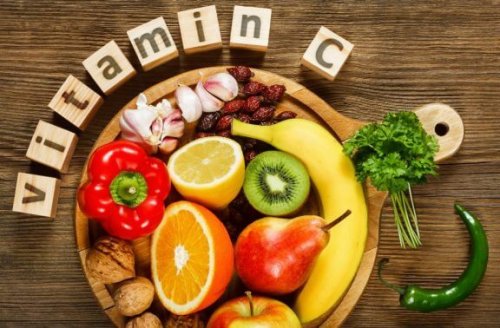Vitamins are a Fundamental Pillar in Nutrition

Vitamins are a fundamental pillar in our diets in order to give the body the necessary nutrients to function properly. The macronutrients in our diets are proteins, carbohydrates, and fats. From these, we then analyze the micronutrients such as vitamins and minerals.
For some of these nutrients, the body only requires small amounts since it can store them. However, a deficiency in any of them can have devastating effects on your health. Vitamins don’t directly provide the body with energy, but vitamins are a fundamental pillar for our bodies.
Vitamins are a fundamental pillar in nutrition
These essential nutrients help the body function properly. The body is not able to synthesize them, thus we must consume them in our diets for the body to use them. They are responsible for controlling protein, fat, and carbohydrate metabolism. Basically, helping convert everything we eat into energy.
Vitamins are a fundamental pillar in our health because they also take part in the proper functioning of the nervous system, hormones, and red blood cells. Additionally, they’re also responsible for regulating metabolism.
Fruits and vegetables have most of the vitamins we require to function properly. However, no one food contains all the necessary vitamins. Therefore, we need to have a varied diet to make sure we consume all of the required nutrients.

Vitamin A
This vitamin plays a large role in fighting infection, skin and mucous health. It may also help prevent night blindness.
The recommended doses of vitamin A is 0.8 to 1.0 micrograms per day. And so, you may be able to find it naturally and ingest it directly from carrots, spinach, kale, and pumpkin. You can also find it indirectly from animal products such as egg yolks and fish.
Vitamin B
There are many vitamins in this group. Ingesting all of these vitamins are a fundamental pillar to help transform food into energy, maintain the wellbeing of the nervous and cardiovascular systems.
- B1 is mainly found in nuts, cereals, peanuts, chickpeas, lentils. Also in meats and eggs.
- B2 helps eye and skin health. Good sources of this vitamin are mushrooms, coconut, lentils, and almonds. Other sources include meat, milk, and eggs.
- B3 deficiency is a big problem for skin health and for the nervous system. You can ingest it in wheat, yeast, meat and other sources.
- B6 vitamins are a fundamental pillar in the central nervous system. The healthiest sources of this vitamin are lentils, chickpeas, banana, avocado, and other fruits and vegetables. However, other filtered sources also include chicken, eggs, and pork.
- Vitamin B9 helps in cell formation, therefore it’s one of the most essential. You can also find it in lettuce, tomatoes, spinach, and nuts.
- Vitamin B12 plays a large role in preventing anemia and in nervous system health. It comes from a bacteria that you can find in most organic farming products such as carrots, tomatoes, and nuts. Additionally, as we do, animals store this vitamin in their organs and muscles.

Vitamins C, D, and E
Vitamins C has antioxidant properties and helps with the absorption of calcium and iron. You can mainly find it in fruits like kiwi, orange, lime, blackberry, and vegetables such as spinach and broccoli.
Now, the main source of vitamin D is the sun rays that we receive on a daily basis. However, we may also find it in our food from sources such as mushrooms and algae. You may also find it in animal-based products such as fish, eggs, liver, and milk.
Finally, vitamin E protects cell membranes. We can also find it in vegetables, oils, nuts, whole cereals, among others.
These vitamins are a fundamental pillar in nutrition because they play a large role in the wellbeing of our bodies. You can find it directly in most foods and you can also take certain supplements if there is no natural source available to you.
Vitamins are a fundamental pillar in our diets in order to give the body the necessary nutrients to function properly. The macronutrients in our diets are proteins, carbohydrates, and fats. From these, we then analyze the micronutrients such as vitamins and minerals.
For some of these nutrients, the body only requires small amounts since it can store them. However, a deficiency in any of them can have devastating effects on your health. Vitamins don’t directly provide the body with energy, but vitamins are a fundamental pillar for our bodies.
Vitamins are a fundamental pillar in nutrition
These essential nutrients help the body function properly. The body is not able to synthesize them, thus we must consume them in our diets for the body to use them. They are responsible for controlling protein, fat, and carbohydrate metabolism. Basically, helping convert everything we eat into energy.
Vitamins are a fundamental pillar in our health because they also take part in the proper functioning of the nervous system, hormones, and red blood cells. Additionally, they’re also responsible for regulating metabolism.
Fruits and vegetables have most of the vitamins we require to function properly. However, no one food contains all the necessary vitamins. Therefore, we need to have a varied diet to make sure we consume all of the required nutrients.

Vitamin A
This vitamin plays a large role in fighting infection, skin and mucous health. It may also help prevent night blindness.
The recommended doses of vitamin A is 0.8 to 1.0 micrograms per day. And so, you may be able to find it naturally and ingest it directly from carrots, spinach, kale, and pumpkin. You can also find it indirectly from animal products such as egg yolks and fish.
Vitamin B
There are many vitamins in this group. Ingesting all of these vitamins are a fundamental pillar to help transform food into energy, maintain the wellbeing of the nervous and cardiovascular systems.
- B1 is mainly found in nuts, cereals, peanuts, chickpeas, lentils. Also in meats and eggs.
- B2 helps eye and skin health. Good sources of this vitamin are mushrooms, coconut, lentils, and almonds. Other sources include meat, milk, and eggs.
- B3 deficiency is a big problem for skin health and for the nervous system. You can ingest it in wheat, yeast, meat and other sources.
- B6 vitamins are a fundamental pillar in the central nervous system. The healthiest sources of this vitamin are lentils, chickpeas, banana, avocado, and other fruits and vegetables. However, other filtered sources also include chicken, eggs, and pork.
- Vitamin B9 helps in cell formation, therefore it’s one of the most essential. You can also find it in lettuce, tomatoes, spinach, and nuts.
- Vitamin B12 plays a large role in preventing anemia and in nervous system health. It comes from a bacteria that you can find in most organic farming products such as carrots, tomatoes, and nuts. Additionally, as we do, animals store this vitamin in their organs and muscles.

Vitamins C, D, and E
Vitamins C has antioxidant properties and helps with the absorption of calcium and iron. You can mainly find it in fruits like kiwi, orange, lime, blackberry, and vegetables such as spinach and broccoli.
Now, the main source of vitamin D is the sun rays that we receive on a daily basis. However, we may also find it in our food from sources such as mushrooms and algae. You may also find it in animal-based products such as fish, eggs, liver, and milk.
Finally, vitamin E protects cell membranes. We can also find it in vegetables, oils, nuts, whole cereals, among others.
These vitamins are a fundamental pillar in nutrition because they play a large role in the wellbeing of our bodies. You can find it directly in most foods and you can also take certain supplements if there is no natural source available to you.
All cited sources were thoroughly reviewed by our team to ensure their quality, reliability, currency, and validity. The bibliography of this article was considered reliable and of academic or scientific accuracy.
- Pérez Ríos, Mónica; Ruano, Alberto. 2004. Vitaminas y salud. Extraído de: http://www.elsevier.es/es-revista-offarm-4-pdf-13065403
- Gamboa Cerda, Cecilia. Vitamina A. Ministerio de Salud de Costa Rica. Extraído de: https://www.ministeriodesalud.go.cr/gestores_en_salud/guiasalimentarias/vitaminaA.pdf
- de Torres Aured, María Lourdes; Francés Pinilla, Marina. Dieta equilibrada. Sociedad Española de Dietética y Ciencias de la Alimentación. Extraído de: http://www.nutricion.org/publicaciones/pdf/Gu%C3%ADa%20AP-Diet%C3%A9ticaWeb.pdf
This text is provided for informational purposes only and does not replace consultation with a professional. If in doubt, consult your specialist.








